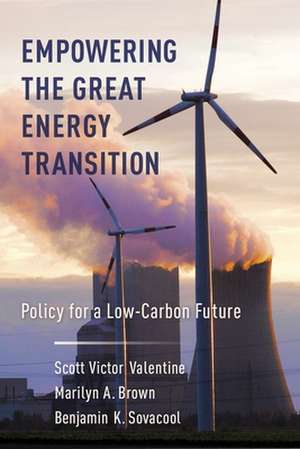Empowering the Great Energy Transition – Policy for a Low–Carbon Future
Autor Scott Valentine, Benjamin Sovacool, Marilyn Brownen Limba Engleză Hardback – 7 noi 2019
Preț: 283.30 lei
Nou
Puncte Express: 425
Preț estimativ în valută:
54.22€ • 56.39$ • 45.44£
54.22€ • 56.39$ • 45.44£
Carte tipărită la comandă
Livrare economică 13-27 martie
Preluare comenzi: 021 569.72.76
Specificații
ISBN-13: 9780231185967
ISBN-10: 0231185960
Pagini: 320
Dimensiuni: 161 x 231 x 26 mm
Greutate: 0.59 kg
Editura: Columbia University Press
ISBN-10: 0231185960
Pagini: 320
Dimensiuni: 161 x 231 x 26 mm
Greutate: 0.59 kg
Editura: Columbia University Press
Notă biografică
Scott Victor Valentine is professor and associate dean of sustainability and urban planning at RMIT University. His books include Wind Power Politics and Policies (2014) and, also with Brown and Sovacool, Fact and Fiction in Global Energy Policy: Fifteen Contentious Questions (2016).
Marilyn A. Brown is a Regents¿ and Brook Byers Professor in the School of Public Policy at the Georgia Institute of Technology, where she directs the Climate and Energy Policy Lab. A former utility regulator, she is a corecipient of the 2007 Nobel Peace Prize for the IPCC Report on Mitigation of Climate Change.
Benjamin K. Sovacool is professor of energy policy at the Science Policy Research Unit at the University of Sussex, where he serves as director of the Sussex Energy Group and of the Center on Innovation and Energy Demand. His publications include Global Energy Justice: Problems, Principles, and Practices (2014).
Marilyn A. Brown is a Regents¿ and Brook Byers Professor in the School of Public Policy at the Georgia Institute of Technology, where she directs the Climate and Energy Policy Lab. A former utility regulator, she is a corecipient of the 2007 Nobel Peace Prize for the IPCC Report on Mitigation of Climate Change.
Benjamin K. Sovacool is professor of energy policy at the Science Policy Research Unit at the University of Sussex, where he serves as director of the Sussex Energy Group and of the Center on Innovation and Energy Demand. His publications include Global Energy Justice: Problems, Principles, and Practices (2014).
Cuprins
Preface
Acknowledgments
1. The Great Energy Transition
2. Sneak Preview of the Challenges to the Energy Transition
3. The Uncertainties of Climate Change
4. Managing Uncertainties While Promoting Technological Evolution
5. Fostering and Financing the Energy Infrastructure Transition
6. Policies for Driving Innovation and Expediting the Transition
7. Consumers as Agents of Change
8. Minimizing Governance Barriers and Creating Polycentric Networks
9. Faster, Further, Farther: Empowering the Great Energy Transition
Notes
Index
Acknowledgments
1. The Great Energy Transition
2. Sneak Preview of the Challenges to the Energy Transition
3. The Uncertainties of Climate Change
4. Managing Uncertainties While Promoting Technological Evolution
5. Fostering and Financing the Energy Infrastructure Transition
6. Policies for Driving Innovation and Expediting the Transition
7. Consumers as Agents of Change
8. Minimizing Governance Barriers and Creating Polycentric Networks
9. Faster, Further, Farther: Empowering the Great Energy Transition
Notes
Index











